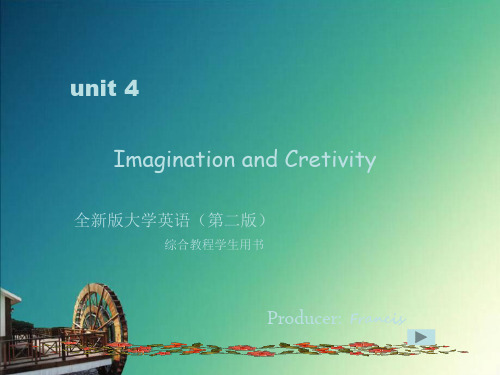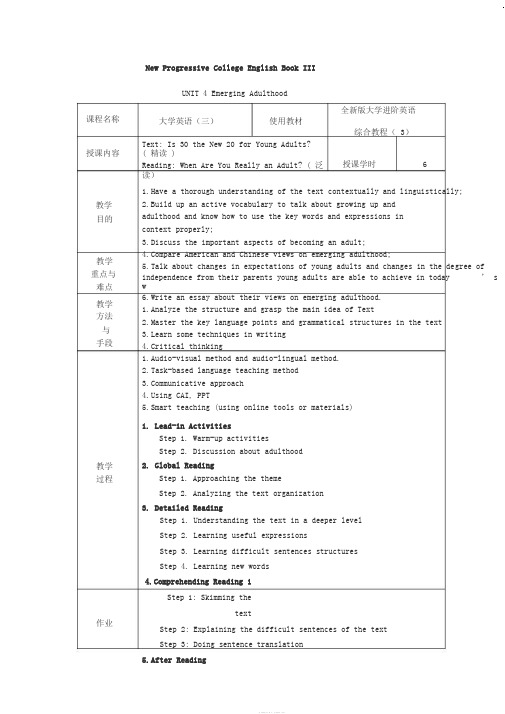全新版大学进阶英语综合教程B3U4
全新版大学英语综合教程第三册课件 Unit 4

Text Organization
Part Two (Paras 4-48)
The narrator gives an account of his encounter with extraterrestrials, making it clear why he claims that they will return no more.
Cultural Notes
Nevertheless, searches have been and are being made for signs that life has arisen in other parts of the universe. Certain knowledge either that life is confined to planet Earth or has been found elsewhere would have the profoundest philosophical implications for mankind.
❖ 2. Is it possible for Aliens to visit us? And support yourself .
❖ 3. What obstacles the interstellar space travel?
Text Organization
Part One (Paras 1-3)
Language Study
work up: spend time and effort preparing; produce or develop gradually The head of the department asked me to work up some sample compositions and give them to the students.
《全新版》大学英语综合教程B3U1-4usefulexpressionandphrases

Unit 1Important words, phrases and sentences:Part One (Paras.1~3) The writer views his life in the country as a self-reliantand satisfying one.1. (L3) get by: be good enough but not every good; manage to live or do thingsin a satisfactory way 过得去get by (on sth) (靠某物)勉强维生;设法维持;对付---It is a little bit difficult for the old couple to get by on such a small pension.---我父母亲靠很少的一些钱凑合着过下去。
My parents managed to get by on a small amount of money.---She never works but somehow she gets by.*2. (L4) frustration: n.1)(state of) being frustrated 灰心;沮丧;不满;失意;受挫---The frustration of our design made us very unhappy.我们计划的失败使我们感到非常难过。
2)instance of this; disappointment 灰心;沮丧;不满;挫折;失望---Every job has its frustrations. 每种工作都有令人不称心的地方。
frustrate: v.1) prevent (sb) from doing or achieving sth 阻止/妨碍某人做成某事---The bad weather frustrated our hopes of going out.2) upset of discourage (sb) 扰乱或阻挠(某人);使沮丧,灰心---Mary was frustrated by the lack of appreciation shown of her work.frustrated: adj.*3. (L5) contentment n. state of being content---with a smile of contentment 带着心满意足的微笑content:1) n. that which is contained in sth 所容纳之物;内容---At the front of the book is a table of contents, giving details of what is in the book.2) adj. Satisfied with what one has; not wanting more; happy 知足;满足;满意be ~ with sth; be ~ to do sth---Are you content with your present salary?---He is content to remain where he is now. 他安于现状。
全新版大学英语第三册 unit 4 Imagination and Creativity

Part Division of the Text Parts Para(s) 13~21 Main Ideas Einstein’s discoveries were attributable to his imagination, questioning, disregard for a u t h o r i t y, p o w e r s o f concentration, and interest in science.
Oh, and by the way, E=mc². Before Einstein, the last scientist who had such a creative outburst was Sir Isaac Newton. It
happened in 1666 when Newton
secluded himself at his mother’s farm to avoid an outbreak of plague at Cambridge. With nothing better to do, he developed his Theory of Universal Gravitation.
unit 4 Imagination and Cretivity
全新版大学英语(第二版)
综合教程学生用书
Francis Producer:
very cool boy Do musician littlethe man? AAwise and husband man great scientist AWife ElbertaEinstein------a old man A you know ugly funny handsome young naughty It' s middle-aged
新进阶3_综合Unit_4

New Progressive College English Book III1. Teaching Objectives:Students will be able toA. have a thorough understanding of the text contextually and linguistically;B. build up an active vocabulary to talk about growing up and adulthood and knowhow to use the key words and expressions in context properly;C. discuss the important aspects of becoming an adult;D. compare American and Chinese views on emerging adulthood;E. talk about changes in expectations of young adults and changes in the degreeof independence from t heir parents young adults are able to achieve in today’s world;F. write an essay about their views on emerging adulthood.2. Time Allotment:1st Period: Lead-in Activities (Warm-up activities; Discussion about adulthood) 2nd Period: Global Reading (Text: Approaching the theme; Analyzing the text organization)3rd Period: Detailed Reading (Understanding the text in a deeper level; Analyzing difficult sentence structures)4th Period: Detailed Reading Continued (Learning new words; Summarizing good usage)5th Period: Comprehending Reading 1 (Skimming the text; Explaining the difficult sentences of the text; Doing sentence translation))6th Period: After Reading (Viewing and listening; Speaking; Assignment) 3. Teaching Procedures:3.1 Lead-in ActivitiesStep 1. Warm-up activitiesThe teacher leads students to figure out the five stages of life (infancy, childhood, adolescence, adulthood and old age) and tells them a new life stage “emerging adulthood” has been proposed by psychologists to describe the period of time between adolescence and adulthood..Method: PPT, communicative approach.Step 2: Discussion about adulthoodThe teacher has students work in pairs and discuss the questions in Opener about their own criteria for reaching adulthood. The teacher reminds students to refer to the helpful words and expressions given below the pictures.Method: Using task-based language teaching method, communicative approach.3.2 Global ReadingStep 1. Approaching the themeThe teacher has students know the background information about the term “emerging adulthood” in Culture Notes.Emerging Adulthood: Starting in 1995, psychologist Jeffrey Jensen Arnett interviewed 300 young people aged 18 to 29 in cities around the nation over five years, asking them questions about what they wanted out of life. Working from those interviews and examining broad demographic indicators, Arnett proposed a new period of life-span development he calls “emerging adulthood”.从1995年开始,历时5年,心理学家杰弗里·阿内特在美国许多城市访谈了300位18-29岁的年轻人,就他们想从生活中得到什么进行提问。
新进阶3综合Unit4

WORD格式课程名称授课内容教学目的教学重点与难点教学方法与手段教学过程作业New Progressive College English Book IIIUNIT 4 Emerging Adulthood大学英语(三)使用教材全新版大学进阶英语综合教程( 3)Text: Is 30 the New 20 for Young Adults?( 精读 )授课学时 6Reading: When Are You Really an Adult? ( 泛读)1.H ave a thorough understanding of the text contextually and linguistically;2.B uild up an active vocabulary to talk about growing up andadulthood and know how to use the key words and expressions incontext properly;3.D iscuss the important aspects of becoming an adult;4.C ompare American and Chinese views on emerging adulthood;5.T alk about changes in expectations of young adults and changes in the degree of independence from their parents young adults are able to achieve in today ’ s w6.W rite an essay about their views on emerging adulthood.1.A nalyze the structure and grasp the main idea of Text2.M aster the key language points and grammatical structures in the text3.L earn some techniques in writing4.C ritical thinking1.A udio-visual method and audio-lingual method.2.T ask-based language teaching method3.C ommunicative approach4.U sing CAI, PPT5.S mart teaching (using online tools or materials)1. Lead-in ActivitiesStep 1. Warm-up activitiesStep 2. Discussion about adulthood2. Global ReadingStep 1. Approaching the themeStep 2. Analyzing the text organization3. Detailed ReadingStep 1. Understanding the text in a deeper levelStep 2. Learning useful expressionsStep 3. Learning difficult sentences structuresStep 4. Learning new words4.C omprehending Reading 1Step 1: Skimming thetextStep 2: Explaining the difficult sentences of the textStep 3: Doing sentence translation5.A fter ReadingWORD格式Step 1. Viewingand ListeningStep 2. SpeakingStep 3.AssignmentAssignment:1.R ead the text inReading 2 andfinish theexercises.2.W rite acomposition aboutyour views onemerging adulthood.3.P review the nextunit.Unit 4Emerging Adulthood1. Teaching Objectives:Students will be able toA. have a thorough understanding of the text contextually and linguistically;B. build up an active vocabulary to talk about growing up and adulthood and know how to usethe key words and expressions in context properly;C. discuss the important aspects of becoming an adult;D. compare American and Chinese views on emerging adulthood;E. talk about changes in expectations ofyoung adults and changes inthe degree of independence from their parents young adults are able to achieve in today ’ sworld;F. write an essay about their views on emerging adulthood.2. Time Allotment:1st Period: Lead-in Activities (Warm-up activities; Discussion about adulthood)nd Global Reading (Text: Approaching the theme; Analyzing the textorganization)2 Period:3rd Period: Detailed Reading (Understanding the text in a deeper level; Analyzing difficult4th Period: sentence structures)Detailed Reading Continued (Learning new words; Summarizing good usage)5th Period: Comprehending Reading 1 (Skimming the text; Explaining the difficult6th Period: sentences of the text; Doing sentence translation))After Reading (Viewing and listening; Speaking; Assignment)3. Teaching Procedures:3.1 Lead-in ActivitiesStep 1. Warm-up activitiesThe teacher leads students to figure out the five stages of life (infancy, childhood, adolescence, adulthood and old age) and tells them a new life stage “emerging adulthood ”has been proposed by psychologists to describe the period of time between adolescence and adulthood..Method: PPT, communicative approach.Step 2: Discussion about adulthoodThe teacher has students work in pairs and discuss the questions in Openerabout their own criteria for reaching adulthood. The teacher reminds students to refer to the helpful words andexpressions given below the pictures.Method: Using task-based language teaching method, communicative approach.3.2 Global ReadingStep 1. Approaching the themeThe teacher has students know the background information about the term “emerging adulthood ”in Culture Notes .Emerging Adulthood : Starting in 1995, psychologist Jeffrey Jensen Arnett interviewed 300young people aged 18 to 29 in cities around the nation over five years, asking them questions about what they wanted out of life. Working from those interviews and examining broad demographic indicators, Arnett proposed a new period of life-span development he calls “emerging adulthood ”.从 1995 年开始,历时 5 年,心理学家杰弗里· 阿内特在美国许多城市访谈了300 位 18-29岁的年轻人,就他们想从生活中得到什么进行提问。
大学英语综合教程B4-U3听力训练及答案

Quiz for U3试卷编号:B4-U3考试时间:30 分钟满分:25 分Part 1 Compound dictation(Each item: 1)Directions:Listen to the passage(s) three times. When the passage is readfor the first time, listen for the general idea. When the passage is read for the second time, fill in the blanks numbered from S1 to S7 with the exact words you hear. For blanks numbered from S8 to S10, write down either the exact words you hear or the main points in your own words. When the passage is read for the third time, check your answers.Questions 1 to 10 are based on the same passage or dialog.A few years ago, my friend and I were walking (S1) 1.on a street near my home in a northern (S2) 2.This area is well-known because it is a beautiful avenue that (S3) 3.4.That day, the sun was (S5) 5.changed. (S6) 6.it started raining very hard. We started to (S7) 7.boulevard to get to the second circle. It was raining so hard that we decided to go inside a restaurant instead. (S8) 8.we did not know what was going on. We went outside the restaurant to see what was happening. People seemed shocked.(S9) 9.were scared. Cars, rocks, and people were floating on the water like little toys toward the little market at the south end of the circle. The height of the water was almost to the top of the trees.After a few minutes, the flood’s flow was reduced, so we decided to leave the area before the water entered the street we were on.(S10) 10.also learned that a dam had burst as the rain started.Part 2 Short passages and multiple choice questions(Each item: 1)Directions:Listen to the following recording, then choose the correctanswers to the questions. You will hear the recording twice. After the first playing, there will be time for you to choose the correct answers. Use the second playing to check your answers.Questions 11 to 15 are based on the same passage or dialog.11. Why was the door to the balcony wide open?A. The weather was hot.B. It was too moist inside.C. It was too dry inside.D. The scene outside was beautiful.12. Why was the man unable to shut the windows?A. The window was deformed.B. The wind was too strong.C. He was scared stiff by the loud thunder.D. He was frightened by the lightning.13. How did he manage to close the window?A. He asked his wife to close it together.B. He used a mop to close it.C. He waited until the wind was less strong.D. He waited until the hail was over.14. What did the speaker do after seeing the lightning?A. He closed the window.B. He turned off the TV.C. He turned off the lights.D. He pulled out the electrical plugs15. What is the sequence of the events?A. Sun---wind---thunder and lightning---sun---hail.B. Sun---hail---thunder and lightning---wind---sun.C. Sun---wind---thunder and lightning---hail---sun.D. Sun---wind---hail---thunder and lightning---sun.Part 3 Short passages and multiple-choice questions(Each item: 1)Directions:Listen to the following recording, then choose the correctanswers to the questions. You will hear the recording twice. After the first playing, there will be time for you to choose the correct answers. Use the second playing to check your answers.Questions 16 to 20 are based on the same passage or dialog.16. What happened to 200 supercarriers in the past 20 years?A. They survived severe storms.B. They lost their ways at sea.C. They were lost with a few survivors.D. They were lost with no survivors.17. What does the woman find surprising?A. Modern technology cannot save supercarriers.B. Modern technology has saved many supercarriers.C. Communications and emergency services have improved fast.D. Communications and emergency services have improved slowly.18. Which of the following is true of the helicopter?A. It was blown into the sea.B. It sank with the supercarrier.C. It saved a few people on the supercarrier.D. It saved the supercarrier.19. What happened to the oil-drilling rig off Canada's coast?A. The workers escaped.B. A lot of people died.C. The rig was overturned.D. The rig exploded.20. Which of the following would be the best title for the dialog?A. Tsunami---the most destructive disaster at sea.B. Rogue waves---the most powerful sea waves.C. Mysteries of sea disasters.D. The fate of different supercarriers.Part 4 Short dialogs and multiple choice questions(Each item: 1)Directions:Listen to the short dialogs, then choose the correct answersto the questions. You will hear the recording twice. After the first playing, there will be time for you to choose the correct answers. Use the second playing to check your answers.21.A. Forest fire is very bad this year.B. Forest fires will be worse next year.C. Forest fire will be brought under control next year.D. Forest fire has been brought under control.22.A. The earthquake was not as strong as the Tokyo one.B. The earthquake was stronger than the Tokyo one.C. The two of them were lucky enough to live in an earthquake-proof hotel.D. The earthquake has leveled the house to the ground.23.A. There will be a volcanic eruption on La Palma island.B. La Palma island will be completely submerged.C. Tidal waves will strike the coasts of two continents.D. Tidal waves will die down along the coasts of Africa and North America.24.A. The man thinks modern technology can tame nature while the woman does not.B. The woman thinks modern technology can tame nature while the man does not.C. Both the man and woman think mankind can conquer nature.D. Neither the man nor the woman thinks mankind can conquer nature.25.A. She knows a lot about floods.B. She is an earthquake expert.C. She is interested in meteorites.D. She is worried about natural disasters.。
全新版大学英语综合教程3Unit4-Passage-B

2) Structure of the passage ▼ Writing style Narration ▼ Part Division The passage can be divided into 3 parts Part 1.(Para. 1—6) The author came across the cloned Mozart and the cloned Mozart would tell his story to the author
ban, forbid, prohibit都含有一定的"禁止"之意 ban n.vt. ---formal, or official prohibition ban sth, ban sb from doing sth, put…under a ban prohibit vt. ---forbid by authority, laws, rules, or regulations prohibit sth, prohibit sb from doing sth forbid vt.---refuse to allow forbid sth, forbid sb to do sth,. forbid sb. from doing sth ---He was forbidden to talk to her.
definite resemblance to my friend here (绝对很像我身边的这位朋友) resemblance n. — similarity, esp. in appearance; likeness There is a clear family resemblance between all the brothers. These prices bear no resemblance to the ones I saw in the ads.
全新大学英语综合教程3-U4课文翻译

Was Einstein a Space Alien?1Albert Einstein was exhausted.阿尔伯特.爱因斯坦精疲力竭。
他幼小的儿子汉斯连续三个晚上哭闹不停,弄得全家人直到天亮都无法入睡。
阿尔伯特总算可以打个瞌睡时,已是他起床上班的时候了。
他不能一天不上班,他需要这份工作来养活组建不久的家庭。
2 Walking briskly to the Patent Office,阿尔伯特是专利局三等技术专家。
在快步去专利局上班的路上,他为母亲忧心忡忡。
母亲年纪越来越大,身体虚弱。
她不同意儿子与迈尔娃的婚事,婆媳关系紧张。
阿尔伯特瞥了一下路过的商店的橱窗,看见自己头发凌乱,他又忘了梳头了。
3Work. Family. 工作,家庭,维持生计——阿尔伯特感受到了一位年轻丈夫和年轻父亲所要承担的全部压力和责任。
To relax, he revolutionized physics.他想放松下,却使物理学发生了突破性进展4 In 1905, 1905年,在他被聘为物理学教授的前四年,26岁的爱因斯坦发表了科学史上最重要论文中的五篇——这些论文都是他在“业余时间”完成的。
他证明了原子和分子的存在。
1905年之前,科学家们对此没有把握。
爱因斯坦论证说光以微粒形态出现(后来被称为“光子”),这为量子力学奠定了基础。
他把狭义相对论描写为:时空如同普通织物中的线,他提出,这些线可以弯曲、拉长和交织在一起。
5 Oh, and by the way, E=mc2.5.对了,顺便提一下,E = mc2。
6 Before Einstein, 在爱因斯坦之前,最近一位迸发出如此创造性思想的科学家当数艾萨克牛顿爵士。
事情发生在1666,为了躲避在剑桥爆发的瘟疫,牛顿去母亲的农场隐居。
由于没有什么更好的事可做,他便建立万有引力理论。
7 For centuries historians called 1666 几个世纪以来,历史学家称为1666牛顿的“奇迹年”。
- 1、下载文档前请自行甄别文档内容的完整性,平台不提供额外的编辑、内容补充、找答案等附加服务。
- 2、"仅部分预览"的文档,不可在线预览部分如存在完整性等问题,可反馈申请退款(可完整预览的文档不适用该条件!)。
- 3、如文档侵犯您的权益,请联系客服反馈,我们会尽快为您处理(人工客服工作时间:9:00-18:30)。
ood.
1.Please arrange the following life stages in the right order.
middle ages / adulthood / infancy / old ages /adolescence/childhood
Unit Four
Objectives:
Students will be able to: talk about different stages in life; learn to use the key words and expressions in
context properly; have a thorough understanding of the text
1. Scan and skim the text, then complete the following table.
2.Pair work: Look at the graph below. Then work with your partner and answer the questions that follow.
Tips: 词根:merg, mers = sink, 表示“沉, 没”
emerge v. 浮现,出现(e出+merge→沉的东西出现→浮现) emergence n. 浮现,出现(emerge+ence) emergency n. 突然事件(emerge+ency→[突然]出现的事情) immerge v. 沉入,浸入(im进入+merge→沉进去→沉入) submerge v. 沉入,沉入水中(sub在下面+merge→沉到下面去) merge v. 合并,融合(沉下→融为一体→合并) emersion n. 浮现,出现(e出+mers+ion→沉下又出现→浮现) immerse v. 沉浸(in进+merse→沉进去→沉浸) submersion n沉没(sub在下面+mers+ion,submerge的名词) submersed a. 在水下的,生于水下的(sub下面+mers+ed)
